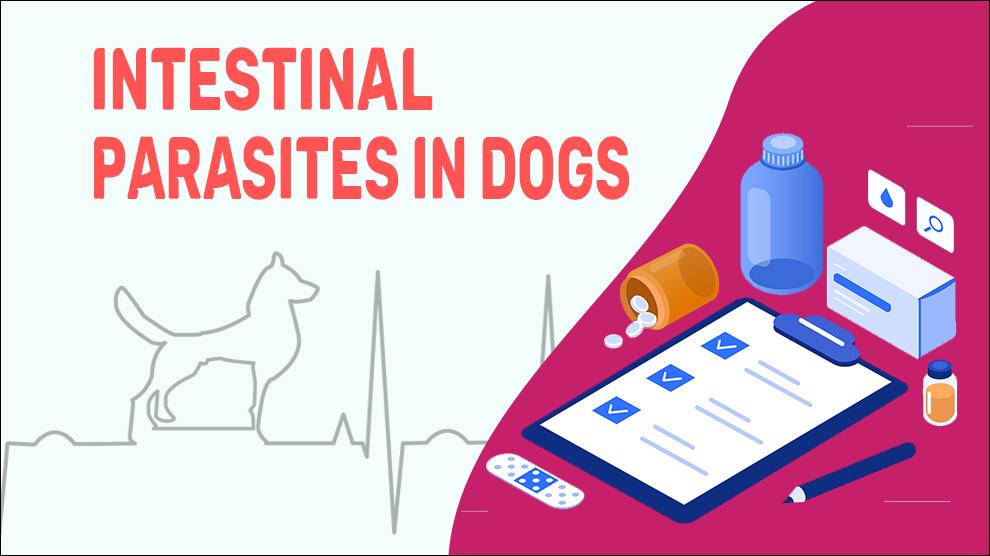While ticks and fleas are easy for pet owners to detect and discern, intestinal parasites may hang on inside your pets causing troubles without you realizing it all of the time.
There are several types of intestinal worms that cause problems in dogs. These include roundworms (Toxascaris leonine, Toxocara cati), hookworms (Ancylostoma species), whipworms (Trichuris vulpis), tapeworms (Echinococcus species, Dipylidium caninum -Taenia species) and protozoans (Non-Worm Parasites such as giardia and coccidia)
Intestinal parasites are a severe problem for young pups. In adult dogs, however, intestinal parasites are only occasionally fatal. Debilitated animals or those that have a weakened immune system are more likely to experience severe intestinal parasitism and show clinical signs due to their worms.
If a dog gets affected by intestinal parasites, they may still go undetected as mostly the signs are nonspecific. The symptoms of intestinal parasites can be attributable to many different canine health problems.
Hookworms are blood-sucking parasites that result in the development of anemia. Roundworms can cause malnutrition and poor growth. A tapeworm does not harm unless the dog is extremely active. Meanwhile, whipworms also pose fewer problems and rarely cause symptoms unless they burrow into the intestinal tissue.
Symptoms Of Intestinal Parasites
- Distended abdomen (belly)
- Diarrhea, with or without blood or mucus
- Anemia
- Scooting
- Vomiting
- Dehydration/Malnutrition/Weight loss
- Decreased activity
- Lethargy and fatigue
- Poor coat appearance
- Hair loss, severe itching
Treatment Options For Intestinal Parasites
Intestinal worms are generally treatable, provided that they are diagnosed and treated at the initial stages of infestation.
Tapeworms: Medication disintegrates tapeworms within the intestinal tract and cannot be seen in feces.
Roundworms: Worms are detached from the intestinal tract, and excreted with the stool.
Hookworms: In the initial treatment, adult hookworms are killed and in subsequent treatment remaining hookworms are killed.
Whipworms: Medication (3-4 week intervals) to prevent a re-infestation (and (every 3-4 months)
Home Remedies For Intestinal Parasites
Parasite infections are never going to go away on their own. While intestinal parasites are treatable, however, keep in mind that the best way to protect your pets against parasites is to using parasite preventatives.
If you haven’t used any monthly parasite preventatives, discuss with your veterinarian to protect your pets and family from intestinal parasites.
Prevention Of Intestinal Parasites
- All puppies (more than 3 weeks of age) should be given initial treatments.
- preventive medication monthly for dog worms
- Follow annual dewormer protocol for dogs as suggested by your vet
- Prompt detection (performing fecal tests 2-4 times yearly for adult dogs) and intervention in the form of a dewormer for dogs
- Clean up the backyard periodically; maintain sanitary and hygienic conditions in the home. This includes limiting internal exposure to fecal matter, host animals, and/or contaminated soil.
- No matter the documented history or age, follow a dewormer immediately upon acquisition of new dogs, then again follow your veterinarian's directions.
Affected Breeds Of Intestinal Parasites
There is no breed predisposition. Puppies, older breeds are overrepresented.
Additional Facts For Intestinal Parasites
Causes:
An adult dog gets parasites through eggs or spores in contaminated water, soil, food or feces.
Flea, tick, Mosquito bites, and ingestion
When comes in close contact with an infected dog
Puppies usually get intestinal parasites from their mother through the placenta and during nursing.
1. Tapeworms (cestodes) - Suburban, rural, and hunting dogs
Transmitted when a dog eats an infected flea
Taenia species, Echinococcus granulosus.
Spirometra mansonoides, Diphyllobothrium, and Mesocestoides species.
2. Roundworms ( ascarids) – young pups
Toxocara canis (pups), Toxascaris leonina (older dogs)
Puppies as early as 1 week get after birth (from the mother through placenta or nursing)
3. Hookworms
Ancylostoma caninum (tropical and subtropical areas of the world)
Ancylostoma braziliense (USA, Central, South America, and Africa)
Uncinaria stenocephala (cooler regions)
4. Whipworms
Trichuris vulpis- found in the colon and cecum
5. Protozoan parasites
Coccidia- canine Cystoisospora spp (microscopic protozoans that live in the intestinal wall)
Giardiasis: protozoan flagellate parasite Giardia is the most common intestinal parasite worldwide.
Mortality:
Intestinal parasites are only rarely serious in adult dogs, that too in weak, immunosuppressed, or in debilitated animals.
Prognosis:
For mild infestation, once treatments have begun a quick recovery can be assured. If there is a severe infestation, it will take longer for your dog to recover.
Always adhere to your veterinarian's treatment plan and use medications as directed.
Most of the medications have to be repeated in two to three weeks to break the life cycle so that we don't just get it again from the same source.
When To See A Vet
Based on the parasite and extent of infestation, deworming medication (anthelmintic) will be recommended by your veterinarian, together with the proper administration protocol.
Food Suggestions For Intestinal Parasites
- To give your dog’s gut time to rest and recover, a short-term fast is recommended (12-24 hrs)
- Feed the dog with a bland diet of one part unseasoned, boiled, boneless, and skinless chicken breast with three parts plain cooked rice.
- Gradually reincorporate your dog's regular food into his diet.
- Provide sufficient amounts of freshwater. Water consumption reduces dehydration.
What to feed?
- Lean Protein and Low-fat meats (ratio of omega-6 to omega-3 fats = 5:1)
- White Rice, Boiled boneless, skinless chicken breast meat
- Potatoes and Pumpkin (canned or pureed)
- Probiotics (yogurt, Goat's Milk, fermented vegetables, kefir with live cultures)
- Mashed boiled potatoes, carrots
- Bananas, Apples, Seaweed
Conclusion
Intestinal parasites are infectious to humans and other animals. Parasites mainly inhabit the GI tract and they are transmitted via larvae or eggs that are passed in the feces or spores in contaminated soil. This makes other dogs and kids vulnerable to inadvertent ingestion and subsequent infection.
Tapeworms are transmitted when a dog eats an infected flea. Tapeworms are not directly transmitted to humans as they need an intermediary host, like a flea!
Your family can be at risk of zoonotic parasitic infections until your pet is dewormed for parasites.

















